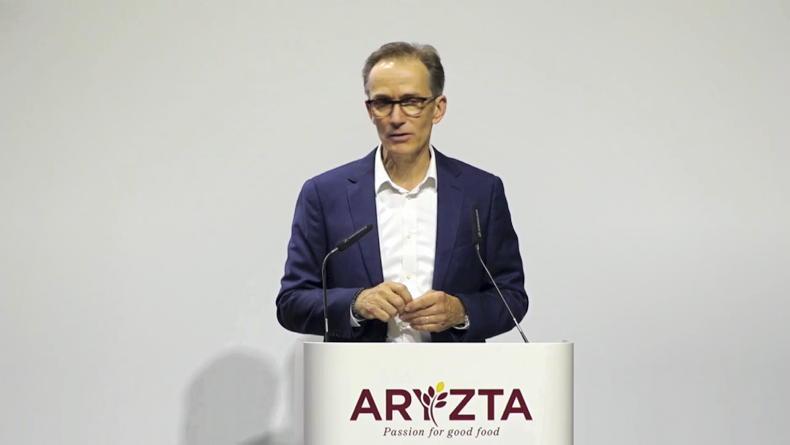While COVID-19 has dominated the news headlines this year, the high-stakes boardroom drama that continues to play out in Swiss-Irish bakery company Aryzta remains one of the most intriguing business stories of 2020.
At last month’s EGM in Switzerland, the group of dissident shareholders who have been pushing for change in Aryzta won the day after securing the overwhelming support of their fellow shareholders to move the bakery giant in a new direction.
Given his deep experience in bakery, Jordi has promised a new direction for Aryzta and a major strategic shake-up of the company
The dissident shareholders won three seats on the board of Aryzta, including the appointment of Urs Jordi as chair of the group. Jordi is the former CEO of Hiestand (the company IAWS plc merged with to form Aryzta in 2008) and served as CEO of Aryzta Europe until 2013.
Given his deep experience in bakery, Jordi has promised a new direction for Aryzta and a major strategic shake-up of the company.

Urs Jordi, chair of Aryzta.
However, Jordi and the dissident shareholders he represents were at risk of falling at the first hurdle. Before the EGM had taken place, Aryzta had already entered into exclusive talks with US asset management firm Elliott about a potential sale of the entire business. The sale talks with Elliott ultimately came to nothing, with Aryzta formally announcing last week that the talks had concluded without a “binding offer”. The conclusion of these talks means Jordi is now free to chart a new strategic path for Aryzta. But in what direction is he likely to take the bakery company?
Asset sale
Jordi says he will formally lay out his plans at the upcoming Aryzta AGM on 15 December. However, it’s already clear that a major asset sale is on the cards. Top of Jordi’s list of disposable assets will be Aryzta’s entire business in the US, which has been a major drag on the company’s performance over the past five years.
Aryzta recently reported a 13% fall in full year sales to €2.9bn for its 2020 financial year, while underlying earnings (EBITDA) slumped 15% to €260m. Group profit margins narrowed slightly to 8.9%.
However, when you look below the topline figures, the standout underperformer is Aryzta’s business unit in the US, which accounts for almost 45% of total group sales but only 25% of profits.
In five out of the last six years, Aryzta’s business in the US has recorded negative organic sales growth as sales volumes drop year after year due to lost contracts
For its 2020 financial year, underlying profits fell 32% in Aryzta’s US division to €67m as profit margins narrowed to just 5.3%. It’s not so long ago that Aryzta’s business in the US could boast of double-digit profit margins as high as 16%.
In five out of the last six years, Aryzta’s business in the US has recorded negative organic sales growth as sales volumes drop year after year due to lost contracts.
Not only has the fall in profitability in this business hurt Aryzta’s bottom line but it has also led to major write-downs on the value of the business. While these write-downs don’t mean any cash losses, they do mean a weaker share price for investors.
In the last four years, Aryzta has incurred impairment and restructuring charges totalling €2.4bn, with much of this related to its struggling US business.
Losses
Unsurprisingly, many Aryzta shareholders would like to see the company cut its losses in the US market and focus on its home market in Europe. This is almost certainly the approach Jordi favours.
Aryzta’s sales in Europe stood at €1.4bn for its 2020 financial year and its profits were only back 6% to €158m this year – despite the major impact of COVID-19. Aryzta’s European business also has a much stronger profit margin of 11.2% – more than double the margin in the US.
A large number of interested buyers are said to be circling some of Aryzta’s US assets, so much so that investment bankers in Switzerland are already estimating the business could fetch anywhere between €600m and €1bn if it were sold, which is a broad valuation of nine to 15 times earnings.
At year-end 2020, Aryzta’s net debts had swelled to just over €1bn, which leaves the company very highly leveraged at almost 3.7 times earnings
Given the fundamental challenges posed by COVID-19 to Aryzta’s business model as a major supplier to food service customers like McDonald’s and Subway, a sale of its struggling US division would not be an inflection point for the company.
But what it would do is generate some much needed cash to help Aryzta reduce its soaring debt profile. At year-end 2020, Aryzta’s net debts had swelled to just over €1bn, which leaves the company very highly leveraged at almost 3.7 times earnings.
If Aryzta could achieve over €600m from the sale of its US business in the next 12 months or so it would give the company some much needed wiggle room on its balance sheet to help ride out the current pressures caused by COVID-19.
Only then might beleaguered shareholders begin to see some recovery in Aryzta’s rock bottom share price.
While COVID-19 has dominated the news headlines this year, the high-stakes boardroom drama that continues to play out in Swiss-Irish bakery company Aryzta remains one of the most intriguing business stories of 2020.
At last month’s EGM in Switzerland, the group of dissident shareholders who have been pushing for change in Aryzta won the day after securing the overwhelming support of their fellow shareholders to move the bakery giant in a new direction.
Given his deep experience in bakery, Jordi has promised a new direction for Aryzta and a major strategic shake-up of the company
The dissident shareholders won three seats on the board of Aryzta, including the appointment of Urs Jordi as chair of the group. Jordi is the former CEO of Hiestand (the company IAWS plc merged with to form Aryzta in 2008) and served as CEO of Aryzta Europe until 2013.
Given his deep experience in bakery, Jordi has promised a new direction for Aryzta and a major strategic shake-up of the company.

Urs Jordi, chair of Aryzta.
However, Jordi and the dissident shareholders he represents were at risk of falling at the first hurdle. Before the EGM had taken place, Aryzta had already entered into exclusive talks with US asset management firm Elliott about a potential sale of the entire business. The sale talks with Elliott ultimately came to nothing, with Aryzta formally announcing last week that the talks had concluded without a “binding offer”. The conclusion of these talks means Jordi is now free to chart a new strategic path for Aryzta. But in what direction is he likely to take the bakery company?
Asset sale
Jordi says he will formally lay out his plans at the upcoming Aryzta AGM on 15 December. However, it’s already clear that a major asset sale is on the cards. Top of Jordi’s list of disposable assets will be Aryzta’s entire business in the US, which has been a major drag on the company’s performance over the past five years.
Aryzta recently reported a 13% fall in full year sales to €2.9bn for its 2020 financial year, while underlying earnings (EBITDA) slumped 15% to €260m. Group profit margins narrowed slightly to 8.9%.
However, when you look below the topline figures, the standout underperformer is Aryzta’s business unit in the US, which accounts for almost 45% of total group sales but only 25% of profits.
In five out of the last six years, Aryzta’s business in the US has recorded negative organic sales growth as sales volumes drop year after year due to lost contracts
For its 2020 financial year, underlying profits fell 32% in Aryzta’s US division to €67m as profit margins narrowed to just 5.3%. It’s not so long ago that Aryzta’s business in the US could boast of double-digit profit margins as high as 16%.
In five out of the last six years, Aryzta’s business in the US has recorded negative organic sales growth as sales volumes drop year after year due to lost contracts.
Not only has the fall in profitability in this business hurt Aryzta’s bottom line but it has also led to major write-downs on the value of the business. While these write-downs don’t mean any cash losses, they do mean a weaker share price for investors.
In the last four years, Aryzta has incurred impairment and restructuring charges totalling €2.4bn, with much of this related to its struggling US business.
Losses
Unsurprisingly, many Aryzta shareholders would like to see the company cut its losses in the US market and focus on its home market in Europe. This is almost certainly the approach Jordi favours.
Aryzta’s sales in Europe stood at €1.4bn for its 2020 financial year and its profits were only back 6% to €158m this year – despite the major impact of COVID-19. Aryzta’s European business also has a much stronger profit margin of 11.2% – more than double the margin in the US.
A large number of interested buyers are said to be circling some of Aryzta’s US assets, so much so that investment bankers in Switzerland are already estimating the business could fetch anywhere between €600m and €1bn if it were sold, which is a broad valuation of nine to 15 times earnings.
At year-end 2020, Aryzta’s net debts had swelled to just over €1bn, which leaves the company very highly leveraged at almost 3.7 times earnings
Given the fundamental challenges posed by COVID-19 to Aryzta’s business model as a major supplier to food service customers like McDonald’s and Subway, a sale of its struggling US division would not be an inflection point for the company.
But what it would do is generate some much needed cash to help Aryzta reduce its soaring debt profile. At year-end 2020, Aryzta’s net debts had swelled to just over €1bn, which leaves the company very highly leveraged at almost 3.7 times earnings.
If Aryzta could achieve over €600m from the sale of its US business in the next 12 months or so it would give the company some much needed wiggle room on its balance sheet to help ride out the current pressures caused by COVID-19.
Only then might beleaguered shareholders begin to see some recovery in Aryzta’s rock bottom share price.







 This is a subscriber-only article
This is a subscriber-only article










SHARING OPTIONS: